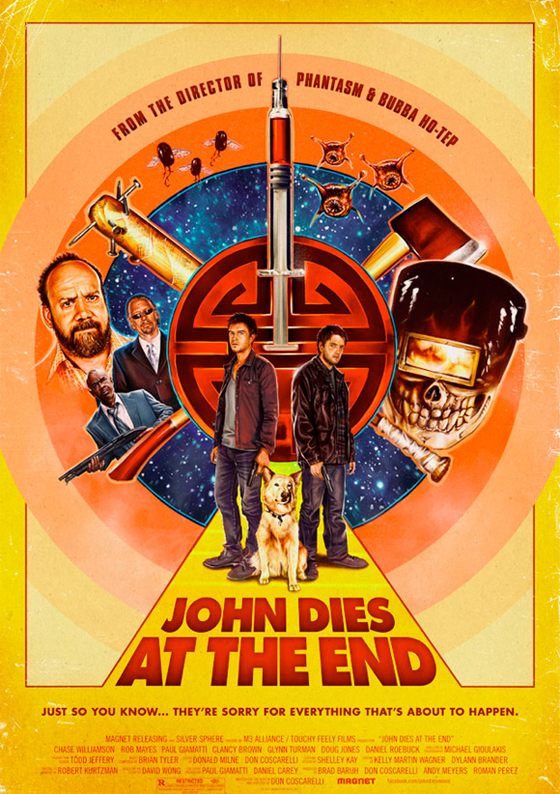Review by Charlie Dunlap
While many maverick directors' career trajectories seem to dip into progressively safer waters over the years, Don Coscarelli's work never seems to lose the creative spark that first lit up the silver screens in 1979 with his refreshingly original and surreal Phantasm, a film that captured enough of the genre's collective consciousness to spawn several sequels throughout the 80?s and 90?s.
In 2002, Coscarelli broadened his career with the well-received and automatic cult classic, Bruce Campbell vehicle, Bubba Ho-Tep, revealing that Coscarelli was more than a one-trick pony whose youthful energy had struck gold via the unique concepts pulsating through Phantasm. Outside of a decent Masters of Horror episode in 2005 and rumors of a Bubba Ho-Tep sequel that has yet to materialize (now entertainingly titled, Bubba Nosferatu: Curse of the She-Vampires), however, Coscarelli largely disappeared before the unveiling of John Dies at the End, an advance screening of which took place at this year's SDFF (with an official release coming on January 25).
Although the intentionally random plot quirks of his latest offering is – much like Bubba Ho-Tep – virtually pointless to relay in depth, the story essentially revolves around two college drop-out friends (played by relative newcomers Chase Williamson and Rob Mayes) in the midwest whom encounter a drug known as "soy sauce." Turning their worlds irreversibly topsy turvy, the "soy sauce" serves as a convenient stimulus for Coscarelli's genre id to go wild in a series of imaginative and surreal set pieces that proudly trump any conventional narrative arcs, and this is precisely where the strength of the film lies. Rather than letting some cardboard cut-out horror plot guide the sort of uninspired material currently clogging the genre's pipelines, Coscarelli uses the ambiguity of Jason Pargin's (writing under the pseudonym of David Wong) source material to weave a variety of sci-fi, comedy, drama, metaphysical and horror elements into a fun and genre-bending ride that never takes itself too seriously, while also earnestly refusing to get bogged down in self-conscious irony.
The results reveal an aging director whom – like Terry Gilliam and Werner Herzog – seems to have found that proverbial fountain of youth, in which to permanently swim and ply his trade. In the end, the overall story is ultimately less important than it's diverse collection of fun and bizarre moments, all of which collectively kept a game audience entertained and on its toes throughout the film's brisk running time. Although it's hard to top the instant cult star power of an actor like Bruce Campbell, John Dies at the End does feature a significant opportunity for Paul Giamatti to successfully show off his zanier and less pretentious side, as well.
Despite enjoying the movie, the real highlight of the night was the opportunity to chat with Don Coscarelli, himself, whom made himself graciously and openly available to chat with those lucky enough to recognize him as we were wading into the theater. This Examiner spoke with him for several minutes, and was pleased to engage with his genuinely kind and down-to-earth demeanor. Most of our conversation revolved around Phantasm, which I admitted to being captivated by as a young kid, after which Coscarelli admitted that he continues to get positive feedback for the film from equally captivated grown ups once similarly traumatized as children by the unique and dreamy sense of creepy atmosphere it exudes. It turns out that this surreal and dreamy quality has genuine roots in reality; upon asking Coscarelli where the idea behind the silver orbs came from, he explained that the entire idea came from dreams he used to have in his own youth.
Maybe the orbs explain his seemingly endless creativity and desire to entertain…Maybe they don't really come from a dream, but from one of the other dimensions implied in John Dies at the End. Perhaps the rorschach ambiguity of their origins (much like the deliberate ambiguity of John Dies at the End's stranger plot points), and their ability to unsettle the mind into multiple intriguing possibilities, is all part of Coscarelli's special brand of magic.
Charlie Dunlap is a passionate, life-long writer and student of film, who recently returned to Denver, CO after obtaining his masters degree in communication at Saint Louis University.




No hay comentarios:
Publicar un comentario